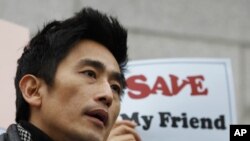China is rejecting South Korean pleas not to repatriate some 30 North Korean refugees who were recently arrested in Chinese territory.
Since last week, several dozen protesters outside of the Chinese Embassy in Seoul have called on Beijing not to repatriate around 30 North Korean detainees Chinese authorities recently arrested.
South Korean activists say their talks with the Chinese government are not going very well and that they will seek global support from the United Nations high commissioner on refugees.
In Beijing Tuesday, Foreign Ministry spokesman Hong Lei indicated his government rejects taking the issue to the United Nations.
Hong says the North Koreans are not refugees because they crossed the Chinese border illegally and for economic reasons. He adds that China thinks the issue is not suitable for U.N. mechanisms and will be handled according to China's laws.
A group of North Korean refugees in South Korea says the refugees could face torture and even public execution if sent home.
In another development, the spokesman says China is welcoming talks this week in Beijing between high-level North Korean and American negotiators.
He says China hopes the outcome of this Thursday's dialogue between U.S. and North Korean negotiators results in the resumption of the six-party talks aimed at persuading North Korea to abandon its nuclear arms programs. He adds that China will continue to play what he describes as “a constructive role” in pushing for peace and stability on the Korean peninsula.
The six-party talks began in 2003 but have been stalled for more than two years, after North Korea expelled international nuclear inspectors. In addition to North Korea, the United States and host country China, the talks include South Korea, Japan and Russia. This is the first U.S.-North Korean meeting since the death of North Korean leader Kim Jong Il in December.
China Rejects Pleas Not to Repatriate North Koreans




